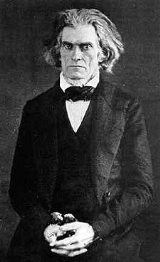
John C. Calhoun
John Caldwell Calhoun was a prominent United States politician from South Carolina during the first half of the 19th century. He served as the seventh Vice President of the United States, first under John Quincy Adams (1825-1829) and then under Andrew Jackson (1829-1832), but resigned the Vice Presidency to enter the United States Senate, where he had more power. He also served in the United States House of Representatives (1810-1817) and was both Secretary of War (1817-1824) and Secretary of State (1844-1845).
Sourced
- The Government of the absolute majority instead of the Government of the people is but the Government of the strongest interests; and when not efficiently checked, it is the most tyrannical and oppressive that can be devised.
- Speech to the U.S. Senate (February 15, 1833).
- Protection and patriotism are reciprocal.
- Speech in the House of Representatives (December 12, 1811) .
- The very essence of a free government consists in considering offices as public trusts, bestowed for the good of the country, and not for the benefit of an individual or a party.
- Speech (February 13, 1835).
- A power has risen up in the government greater than the people themselves, consisting of many and various and powerful interests, combined into one mass, and held together by the cohesive power of the vast surplus in the banks.
- Speech (May 27, 1836). This is the source of the phrase, "Cohesive power of public plunder".
- Our well-founded claim, grounded on continuity, has greatly strengthened, during the same period, by the rapid advance of our population toward the territory—its great increase, especially in the valley of the Mississippi—as well as the greatly increased facility of passing to the territory by more accessible routes, and the far stronger and rapidly-swelling tide of population that has recently commenced flowing into it.
- Letter to Richard Pakenham, British minister to the United States, concerning the boundary dispute between the two countries (September 3, 1844).
- The surrender of life is nothing to sinking down into acknowledgment of inferiority.
- Speech in the Senate (February 19, 1847).
- It is harder to preserve than to obtain liberty.
- Speech in the Senate (January 1848).
Unsourced
- Beware the wrath of a patient adversary.
- Our Federal Union, next to our liberty most dear.
- In looking back, I see nothing to regret and little to correct.
- Learn from your mistakes and build on your successes.
- The interval between the decay of the old and the formation and establishment of the new constitutes a period of transition which must always necessarily be one of uncertainty, confusion, error, and wild and fierce fanaticism.
